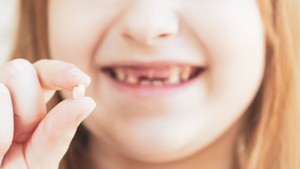Blog
As parents, one of the milestones we eagerly anticipate is our child losing their baby teeth. It’s a sign that they are growing up and making way for their permanent teeth.
As parents, one of the milestones we eagerly anticipate is our child losing their baby teeth. It’s a sign that they are growing up and making way for their permanent teeth. But when do baby teeth fall out and what can we expect along the way? In this article, we will explore the average age at which kids start losing their baby teeth, the losing teeth schedule, what to do when a tooth becomes loose, the importance of oral health during this transition, and where to go for expert dental care.
When Do Baby Teeth Fall Out? The Average Age
The timing of losing baby teeth can vary from child to child, but most children start this process around the age of 6 or 7. Typically, the process continues until around age 12 or 13 when all permanent teeth have erupted. Understanding the age for losing teeth is essential for anticipating this developmental stage.
Factors such as genetics and the order of teeth that come in can influence the timing. Children who had their teeth come in earlier may also lose them earlier. While there is an average age range, each child is unique, and variations are normal. If your child falls slightly outside this range, there’s usually no cause for concern.
Signs that indicate your child’s tooth loss is on track include the lower front teeth (lower central incisors) being the first to loosen and fall out, typically around age 6 or 7. As the baby teeth fall out, permanent teeth will gradually emerge in their place.
If you have concerns about your child’s tooth loss or if they experience delayed tooth loss, consult with a pediatric dentist. They can assess your child’s oral health and provide specific guidance on the losing teeth schedule and when the age teeth are lost.
What to Do When It Comes Loose
When your child’s baby teeth start to become loose, it’s important to know how to properly care for them and ensure a smooth transition to permanent teeth. Here are some tips on what to do when a tooth is loose:
Proper care and hygiene for loose teeth:
Encourage your child to maintain good oral hygiene by gently brushing their teeth twice a day with a soft-bristled toothbrush. Remind them to be extra careful around the loose tooth, using gentle circular motions to clean the area. Additionally, ensure they continue to floss daily, being cautious around the loose tooth to avoid any discomfort.
Gentle techniques to help a loose tooth come out naturally:
While it’s tempting to pull a loose tooth, it’s best to let it come out naturally. Encourage your child to wiggle the tooth gently with clean hands or their tongue. Eating crunchy foods like apples or carrots can also help loosen the tooth. However, if the tooth is causing pain or doesn’t come out after a few weeks, it’s essential to schedule a visit to our dental office for professional guidance.
Avoiding common mistakes that can cause pain or damage:
It’s crucial to avoid certain actions that can cause pain or damage to a loose tooth. These include biting on hard objects, like pencils or ice, as well as twisting or yanking the tooth forcefully. These actions can lead to pain, bleeding, or potential damage to the surrounding teeth and gums.
Remember, losing baby teeth is a natural part of a child’s development. By following these tips, you can ensure the process is as comfortable and safe as possible for your child. If you have any concerns or questions about your child’s loose tooth, don’t hesitate to reach out to our experienced dental team.
What’s behind your smile?
Understanding the anatomy of baby teeth and permanent teeth is essential for parents to ensure their children’s oral health. Baby teeth, also known as primary teeth, begin to erupt around six months of age and continue until the child is around three years old. These teeth play a crucial role in speech development, chewing, and guiding the permanent teeth into their proper positions.
When it comes to speech development, baby teeth are essential. They help children learn to pronounce sounds correctly, enabling them to communicate clearly. As children lose their baby teeth and permanent teeth start to emerge, it is common for speech patterns to change temporarily. However, this is usually a natural part of the transition and should improve as the child adjusts to their new teeth.
Maintaining oral health during the transition from baby teeth to permanent teeth is vital. While baby teeth are temporary, they still require proper care and attention. Neglecting oral hygiene during this period can lead to dental issues, such as tooth decay and gum disease. Regular brushing, flossing, and dental check-ups are crucial to ensure a healthy transition and set the stage for lifelong oral health.
Where to go next
Now that you have a better understanding of the process of losing baby teeth, it’s important to know where to go next to ensure your child’s oral health needs are met. Here are a few important topics to consider:
Tips for a smooth transition to adult teeth: The transition from baby teeth to adult teeth is an exciting milestone in your child’s dental development. To ensure a smooth transition, encourage your child to maintain good oral hygiene habits, such as brushing and flossing regularly. It’s also important to monitor their diet and limit sugary foods and drinks that can contribute to tooth decay. Regular dental check-ups will help identify any potential issues and ensure proper care.
Importance of ongoing dental care and check-ups: Even after your child’s baby teeth have fallen out and their adult teeth have fully developed, it’s crucial to continue with regular dental care and check-ups. Routine visits to the dentist help monitor the growth and development of your child’s teeth, detect any potential oral health problems early on, and provide preventive treatments to maintain optimal oral health.
At Leap Kids Dental, we understand the importance of your child’s oral health and are committed to providing top-quality pediatric dental care. Our team of experienced pediatric dentists and friendly staff create a comfortable and positive environment for your child’s dental visits. Contact us today to schedule an appointment and ensure your child’s oral health needs are met.





